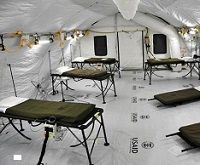Ebola: US Troops to Get Tekmira's Treatment
Canada-based Tekmira Pharmaceuticals will supply US troops in West Africa with 500 doses of its promising experimental Ebola treatment, the company announced today. The company specializes in RNA interference delivery technology. The new product interrupts the Ebola virus's life cycle. The US Army announced that on Saturday it will open an Ebola treatment unit for medical workers infected with the virus in Monrovia, Liberia. (The unit is seen in photo.)

Canada-based Tekmira Pharmaceuticals will supply US troops in West Africa with 500 doses of its promising experimental Ebola treatment, the company announced today. The company specializes in RNA interference delivery technology. The new product interrupts the Ebola virus’s life cycle.
The US Army announced today that on Saturday it will open an Ebola treatment unit for medical workers infected with the virus in Monrovia, Liberia. (The unit is seen in photo.)
Yesterday President Barack Obama announced he would seek $6.2 billion from Congress for more Ebola aid, including $112 million for the military.
The drug company supplying the experimental treatment has been working with researchers from Boston University and the US Army Medical Research Institute for Infectious Diseases to come up with a therapeutic product, and in 2010 signed a $140 million US Department of Defense contract to develop such an agent to treat Ebola.
In March, 2014 the company got a fast track designation from the US Food and Drug Administration to develop such an Ebola treatment.
The drug being released to the US Army targets the Ebola-Guinea virus, which is a predominant strain in the recent West Africa outbreaks.
A similar Tekmira drug called TKM-Ebola is meant to treat the Ebola-Zaire strain. It was used to treat Richard Sacra, MD, a US resident infected with Ebola in Liberia who was successfully treated at a federal biocontainment facility in Nebraska. Sacra also got plasma donated by an Ebola survivor.
The US Department of Defense exercised an option it had in its contract with Tekmira to purchase the Ebola-Guinea strain therapeutic, an option worth $7 million, Reuters reports.
Meanwhile today, the United Nation’s top official in charge of Ebola response told the Associated Press he expects that the outpouring of global support in the effort to contain Ebola could mean the outbreak will be contained by sometime in 2015.
Donors include Facebook CEO Mark Zuckerberg and his wife Priscilla Chan ($25 million). Zuckerberg also announced that Facebook has put an Ebola-donation button on Facebook.
Ebola virus has caused more than 7,000 deaths in three West Africa nations.
That effort, and campaigns in West Africa to convince people to change certain ritual and practices—such as funeral practices that involved kissing and touching the deceased “made me incredibly optimistic that in the coming months we could certainly see a diminution and hopefully in the next year the outbreak will come to an end,” said the UN’s David Nabarro, MD in the interview.
In the US, only one Ebola patient Craig Spencer, MD remains hospitalized and several accounts today described Spencer as recuperating by riding a stationary bicycle and playing a banjo.
Several hundred people remain under monitoring in both New Jersey and New York, mostly people who arrived from West Africa. They are required to contact public health officials daily.
In Texas, the last of patients being monitored because they had possible direct contact with an Ebola patient have been declared free of the virus.
In a TV appearance, recovered nurse Amber Vinsom said she had not been careless in trying to protect herself from the virus and defended her decision to fly out of state even though she had a fever. On her return to Dallas she was confirmed to have the virus and was hospitalized in a biocontainment facility in Atlanta, GA.